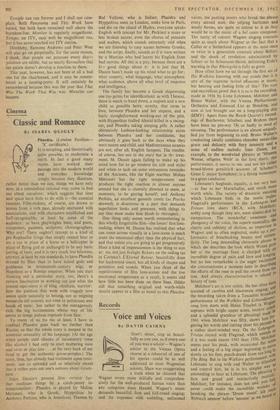Cinema
By ISABEL QUIGLY
Classic and Romance
IT is tempting, and theoretically quite possible, to modernise a myth. In fact a good many myths have worked their passage into the modern world and everyday knowledge simply because they illustrate, rather better than we can, things we have only now, in a roundabout rational way, come to find out about ourselves: which suggests that time and space have little to do with it—the essential remains. Film-makers, of course, are drawn to stories from a rich past, already encrusted with associations, and with characters established and half-recognisable, at least by some of the audience: so have playwrights been, and poets, composers, painters, sculptors, choreographers. Why not? There oughtn't (except to a kind of pre-Raphaelite fringe that simply cannot bear to see a car in place of a horse or a helicopter in place of flying god or archangel) to be any basic jarring of taste; and it is very much less hilarious, anyway, at least by our standards, to have Phaedra dressed by Dior than to have naked gods and goddesses in seventeenth-century wigs, or Napoleon as a Roman emperor. When you start thinking out a particular story, too, there's a certain fascination in working out just what the present equivalent is of king, chieftain, warrior: how the position that went with tragedy now seems quite naturally to belong, not to reigning monarchs (of course), not even to politicians and heads of state: but rather to the outrageously rich, the big businessmen whose way of life seems to tempt jealous reprisals from fate.
To many of us (to me at least, I have to confess) Phaedra goes back no further than Racine, so that the whole story is steeped in the sonorous sensuality of his language. (At the age when people used chunks of incantatory verse like alcohol I had only to start muttering mon mal vient de plus loin . . . at the very back of my head to get the authentic goose-pimples.) The story, then, has already had treatment upon treat- ment; one so splendid and so relatively recent that it rather puts out one's notions about Greek- ness.
Jules Dassin's present film version fur- ther confuses things by a catch-penny in- ternationalism : Phaedra is played by Melina Mercouri, who is Greek; Hyppolitus by Anthony Perkins, who is American; Theseus by
Raf Vallone, who is Italian; Phaedra and Hyppolitus meet in London, make love in Paris, and die on the island of Hydra; everyone speaks English with (except for Mr. Perkins) a more or less broken accent, even the chorus of peasants and wailers, which sounds extremely odd when we are listening to cosy scenes between Greeks; and the script, finally, sounds as if it were written by a Martian who had learnt his English from bad movies. All this is a pity, because there are a fc-v good things about it: it is just that M. Dassin hasn't made up his mind what to go for: what country, what language, what atmosphere, what audience, above all what level of response and intelligence.
The family has become a Greek shipowning one (no prizes for identification): as with Theseus, there is much to hand down, a stepson and a new child as possible heirs; enmity, that turns to love, between Phaedra and her stepson, and a fairly straightforward working-out of the plot, with Hyppolitus (called Alexis) killed in a racing- car, and Phaedra taking sleeping pills. A rather obtrusively Lesbian-looking relationship exists between Phaedra and her confidante, but obviously it goes back to the days when they were nanny and child, and Mediterranean nannies are not, after all, English Jampots. The trouble. of course, lies not in the story but in th7 treat- ment, M. Dassin again failing to make up his mind how far to go modern (in talk and style) and when to tack on some extraneous reminder of the Ancients, like the Elgin marbles. Melina Mercouri has the right temperament and produces the right reaction in almost anyone around but she is clumsily directed to seem, at moments, to be guying herself; and Anthony Perkins, an excellent goonish comic (as Psycho showed), is disastrous in a part that demands superlative looks and presence, with things to say that must make him blush in retrospect.
One thing only seems worth remembering in this wholly forgettable film—the lovers' first love- making, where M. Dassin has realised that what can come across visually in a love-scene is much more the emotional effect than the physical fact, and that unless you are going to get progressively bluer a kind of impressionism is the thing to aim at: no, not just firelight flickers on the ceiling (as in Cocteau's L'Eternel Retour, beautifully done but hackneyed since), but all kinds of shapes and presences and sounds. When you think of the repetitiveness of film love-scenes and the low emotional temperature as a result, it seems odd how little has been done on these lines. Odder still that something original and worth-while should appear in a film as banal as this Phaedra.






























 Previous page
Previous page